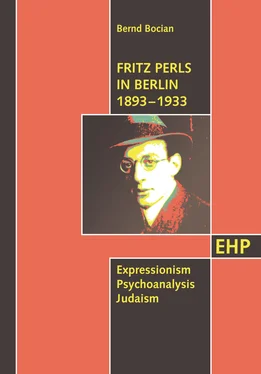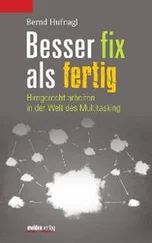With respect to the analysis of the figuration 12of personal life experiences and theory production in Fritz Perls, the present study pursues a line of inquiry that Plöger’s article on the methodological problems and perspectives of biographical research sums up very aptly, terminologically speaking, for our purposes, namely, »How did this Gestalt come into existence?« (Plöger in Dickow 1988, 94). In answering this question, I hew to the hermeneutic tradition and regard those concepts of the Gestalt approach which are represented specifically by Fritz Perls as practice that has become symbol, as life which has »coalesced« into texts. By analyzing existing sources and new material, I will attempt to elucidate and interpret his life within the historical context of its times. I will include the political, cultural, and intellectual factors that influenced it, as well as the subjective learning, adjustment, and processing mechanisms that came into play during its course. In keeping with Gestalt therapy’s »contextual method« (Perls et al. 1996, 243 f.), I embed individual biographical memories within the life-environment that served as a backdrop and gives them meaning. To that end, I have drawn on previously unknown and unpublished biographical material from German and Austrian archives and libraries, as well as excerpts from the personal correspondence 13of Fritz and Lore Perls during the period.
The interpretation of biographies always remains open-ended. Yet by the same token, every time a life is looked at anew, previously unseen or even forgotten aspects emerge. My efforts to avoid a purely subjective interpretation of Perls’s life were supported – apart from the analysis of the complex historical context of his life – by consulting the published memoirs of people who were his contemporaries and moved in a similar or, partially, even in the same milieu as he. Comparisons showed that similar life experiences led to conclusions pointing in the same direction.
In principle, I prefer an approach that follows Peter Gay’s so-called »horizontal connections« (Gay 1979, 8), which he differentiates from the »vertical connections« in historical studies. In Gay’s view, establishing vertical connections and using historical events »as clues of crimes to come« (ibid.) represents a legitimate method, for example, viewing historical events in Germany from the perspective of the horror of National Socialism. The horizontal perspective I favor in the present monograph concentrates on the actual experiences of the individuals. This method is closer to the »contextual method« typically seen in the Gestalt approach (Perls et al. 1996, 243 f.), that is, closer to what Perls and Goodman called »Gestalt analysis« (ibid. 232). 14In Gestalt psychology, the traditional assumption is that every subject’s convictions correspond to the inner conditions prevailing during their experiences as well as those characterizing their field, and that reality is always created subjectively in the field of actual life. Accordingly, Gay emphasizes that the horizontal perspec tive focuses its attention on the then present of the individuals, which was »anything but a chamber of potential horrors. It was a blooming buzzing confusion alive with conflicts and uncertainties and gratification. Their present was what the present always is: bewildering, luxuriant in illegible, often contradictory clues« (Gay ibid., 9 f.).
At this point, we cannot avoid mentioning that a researcher’s perspective is always limited and affected by his subjective interests, among other things. The author of a biographical study hopes not only »to gain additional knowledge of the world, but also to increase his insight into himself« (Schwarze 1987, 11). Examining the life of another is arguably always »a process of gaining selfknowledge through the other person« (ibid.). 15
I. BIOGRAPHICAL COMPONENTS
1. Formative Life Contexts. War – Expressionism – Psychoanalysis
Friedrich Salomon Perls was born in Berlin in the year 1893 as the third child and only son of a Jewish family from the Eastern part of the German Empire. This date and origin place him in a certain social and historical context. In answer to the question of which formative social influences Perls’s generation assimilated, I would like to cite the following important spheres of influence – naturally, from a focused perspective based on my knowledge of the later course of his life.
1) Fritz Perls was a member of the so-called »front generation,« those born in the 80s and 90s of the 19 thcentury. During their youth, these people experienced the euphoric upswing and anxiety about the future that was part of the years leading up to the First World War, and they numbered among the age group »that was most frequently posted to the front lines, spent the longest amount of time there, and were therefore a ›front generation‹ in a special sense« (Peukert 1987, 30). As a rule, it was only after completing their military service that these young men gathered experience with politics, started families, or launched their careers which were generally delayed until they returned home from the war (see Peukert ibid.).
Moreover, the experience of war surely allowed virtually none of the soldiers to return home without traumatic experiences from the bulletriddled trenches that were glutted with corpses. But after the revolution and collapse of the emperor’s ancient imperial world, »home« no longer consisted of the accustomed social order and its specific values. The majority of young men who served in the war and stemmed from middle class backgrounds reacted to the experience of war, the experience of defeat, their disappointed fantasies of grandeur, and the loss of time-honored social and human orientations by seeking and finding new support in right-wing »volkish« 1ideologies. Perls’s mode of reaction took a different course, with his socialization in the bohemian circles of Berlin playing a decisive role.
2) Many representatives of avant-garde culture in the Weimar Republic stemmed from the front generation. This movement of innovators created works of lasting effect along the sidelines of established institutions, and it was »a place where genuine alliance took place between Jews and Germans as they encountered one another on the terrain of a common revolt« (Traverso 1993, 53). The underlying influence was that of Expressionism, which was already exerting an effect during the days of the empire. As a designation of an epoch, it comprised the period from 1910 to 1925, at the latest (see Vietta 1994). The so-called Expressionist generation was »chaotically torn by its experience of destroyed tradition and lost identity« (Glaser 1976, 200). After the First World War, this part of the front generation regained its identity through revolt; it searched for the »new man« in a socialist »brotherhood« that lay beyond the patriarchal social order and the struggle against the patriarchal father, beyond the self-constraint mechanisms of the super-ego and a mentality of social subservience.
Here, I attach importance to the interpretational approach suggested by Vietta (1994) who attempted to grasp the manifold artistic styles and phenomena of the age by filtering out an inner cohesiveness. For Vietta, the hallmark of the Expressionist epoch is the dialectic between the personal experience of ego-dissociation and the yearning for a renewal of humanity, or, between the experience of alienation and the messianic call for individual transformation (see ibid., 22). Seen in this light, the core of Expressionism is not the actual artistic act, but rather a specific experience of the self and the world. 2As I will demonstrate, this experience can also be found in Perls who moved in the artistic and bohemian circles implied here during the years in question.
Читать дальше











